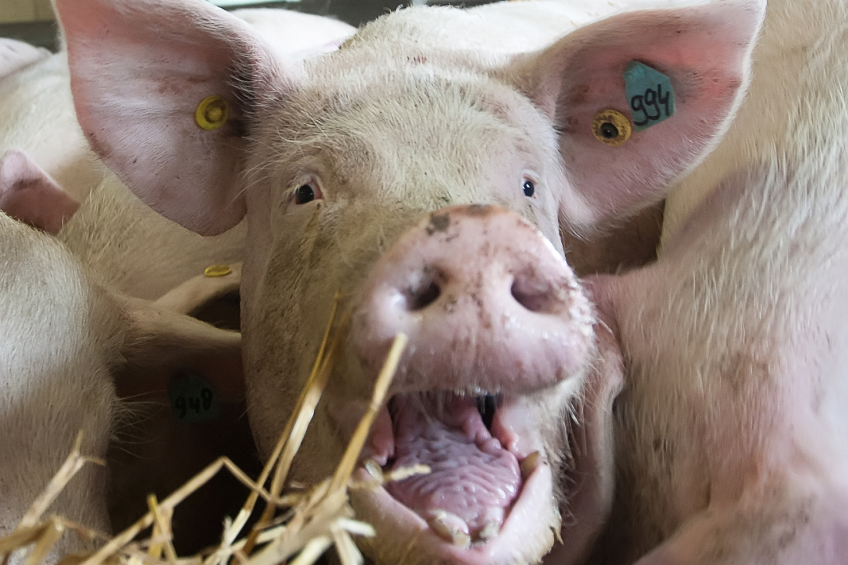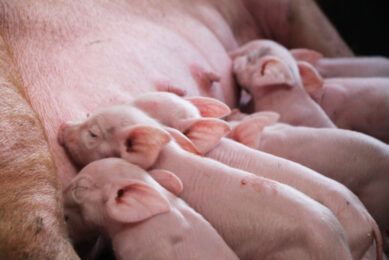Grower pigs like straw rack and straw feeder

In a trial using 4 different types of straw dispensers, researchers observed that grower pigs like a straw rack and a straw feeder the best.
The Belgian research was carried out by scientists attached to the KU Leuven and Thomas More University College.
Short-term effects of straw applications
The researchers explain that they investigated the short-term effects of 4 straw applications on pigs housed on slatted floors, to determine differences in behaviour, straw use and growth. Both the type of straw used and the design of the application might influence the attractiveness and effectiveness of the applications.
To this end, they tested 4 straw applications simultaneously (1 application per pen), presenting them to 6 pigs during 2 weeks.
This experimental set-up was repeated 3 times. The 4 applications tested were:
| Object | Description | Brand | Size |
| Funbar | This dispenser, filled with chopped straw, consisted of a vertical plastic pipe and a dispensing unit. The pigs needed to manipulate this unit to obtain straw | Ikadan Systems A/S, Denmark | Length dispenser: 70 cm, dimensions dispenser unit: 100×70 mm |
| MIK Toy | A cylindrical dispenser made of steel. It contains a compressed straw block (made of chopped straw) with an average weight of 1.6 kg | MIK International AG, Germany | Dimensions of the dispenser: 80×580 mm; dimensions of the aperture: 120×80 mm |
| Rack | A rack with openings measuring 50 × 50 mm. No trough was provided under the rack to recover straw | Homemade | 50×50 cm, dimensions of an opening: 7×7 cm |
| Straw feeder | Looks like a single space dry-feeder. Five metal chains are positioned under the reservoir (filled with long straw). Straw that was pulled from the reservoir but not ingested orally, fell into a trough under the reservoir | Verbakel NV, the Netherlands | Dimensions of the feeder: 110×40 cm; dimensions of the surface 50×50 cm, dimensions of an opening: 7×7 cm; covered by chains: 40×35 cm |
All 96 pigs had ad libitum access to straw from one of the applications. Behaviour was recorded using video cameras and analysed per individual pig for week 1 and week 2 of each experimental set-up separately using the logistic mixed model.
Results
The researchers write: “The rack and straw feeder were explored and manipulated the most. In addition, the duration of sustained contact with the application was longer in presence of these applications. This result might be related to the use of long straw.
“The straw use in presence of the rack was very high, with an average straw use of 2 kg per pen (6 pigs) per week.”
Decrease of contact in second week
In the review, the scientists observed that for all applications, direct contact with the application decreased during the second week compared to the first week. However, this decrease was the smallest in pens with the MIK Toy.
Synchronised use of the applications was seen to a small extent, as in most cases not more than two pigs showed application interaction simultaneously. According to the scientists, the presence of the Funbar (straw dispenser) was associated with a higher frequency of belly-nosing, nosing other body-parts of pen mates and manipulating pen fittings.
The scientists suggest that the use of chopped straw might be related to a higher frequency of manipulating pen-mates, but it is not clear whether the type of straw explains this result. Growth and the presence of skin lesions did not differ between the applications.
Straw rack and feeder attract pigs
The researchers state that it can be concluded that the straw rack and feeder attract pigs to a larger extent. In addition, these applications are associated with longer durations of sustained contact. Straw use, however, is very high in presence of the rack.
The Funbar straw dispenser is the least preferred application regarding behavioural effects, the scientists conclude. It seemed that this application did not offer growing pigs the same distraction as the other applications.
The research was published in Applied Animal Behaviour Science conducted by Anneleen Bulens, Sanne Van Beirendonck, Jos Van Thielen, Nadine Buys and Bert Driessen.











